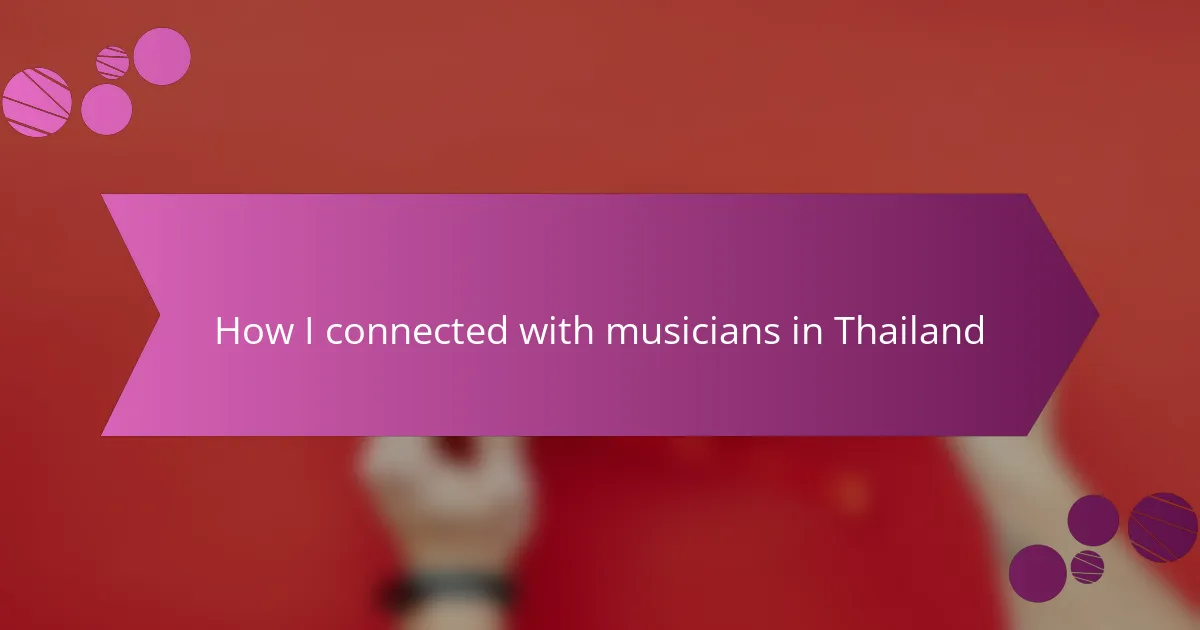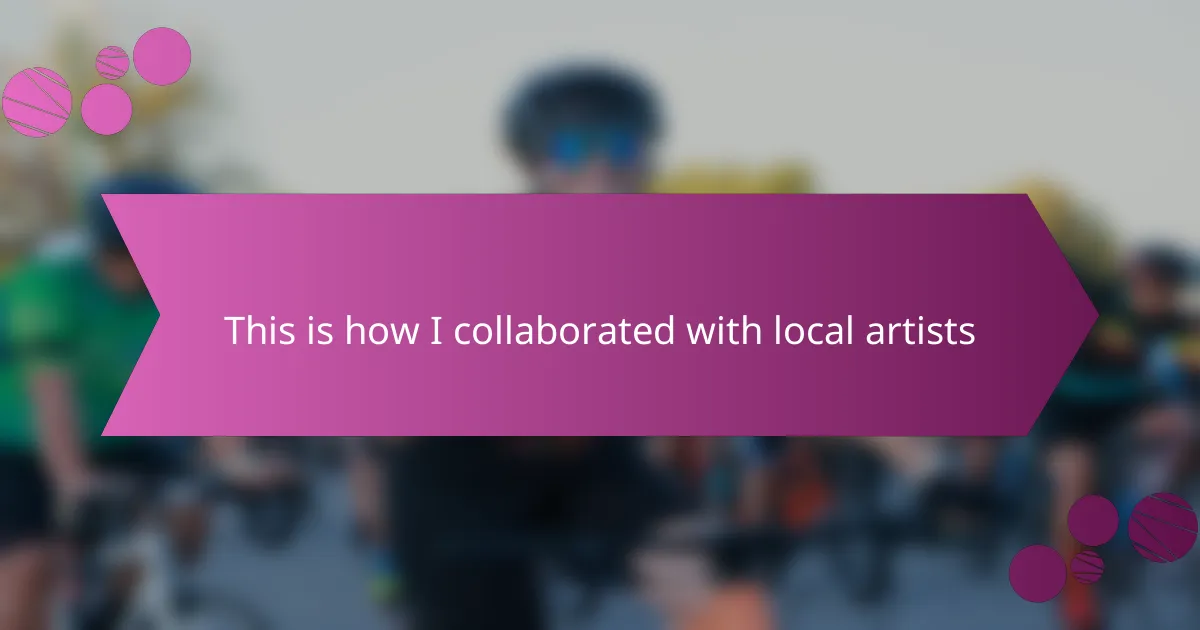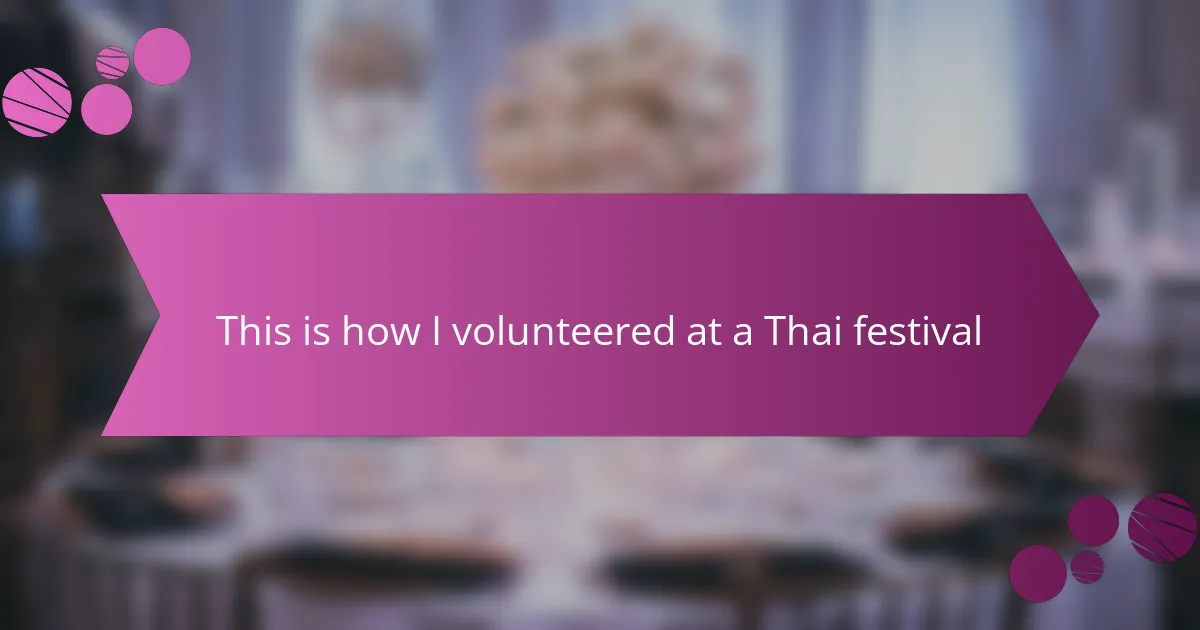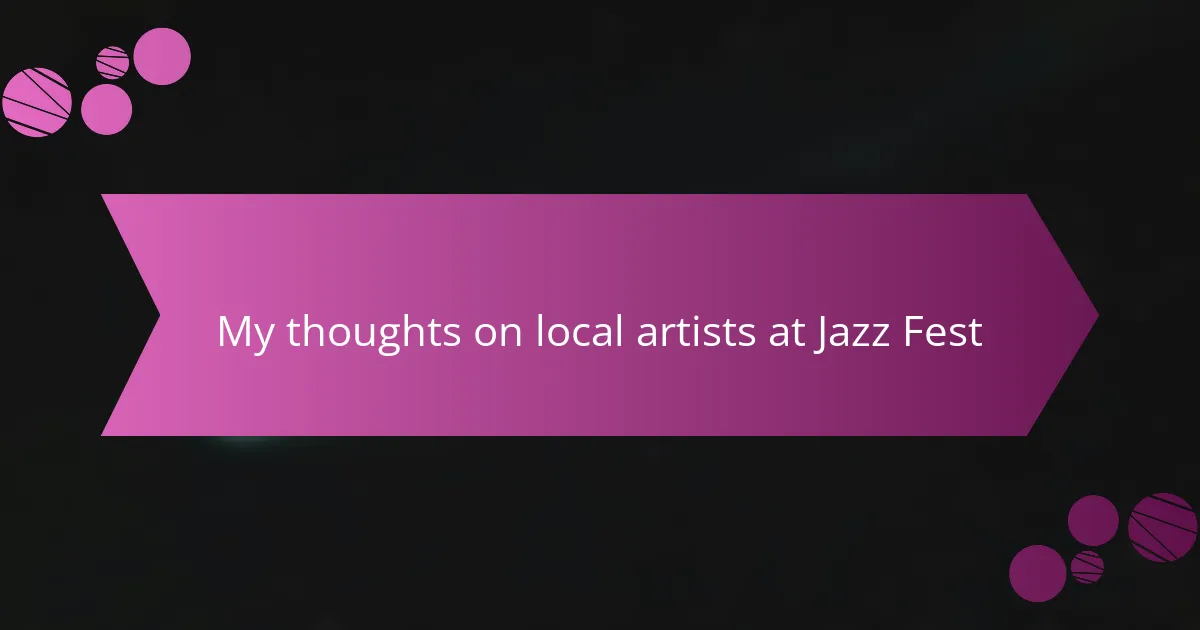Key takeaways
- Thai music festivals blend traditional and contemporary sounds, fostering a sense of community and belonging among attendees.
- Engaging with musicians enhances the festival experience by creating deeper connections and appreciation for their art.
- Popular festivals like Songkran and Wonderfruit offer diverse genres and unique cultural experiences that build lasting memories.
- Networking strategies, such as showing genuine curiosity and engaging with fellow attendees, can lead to meaningful connections and collaborative opportunities.
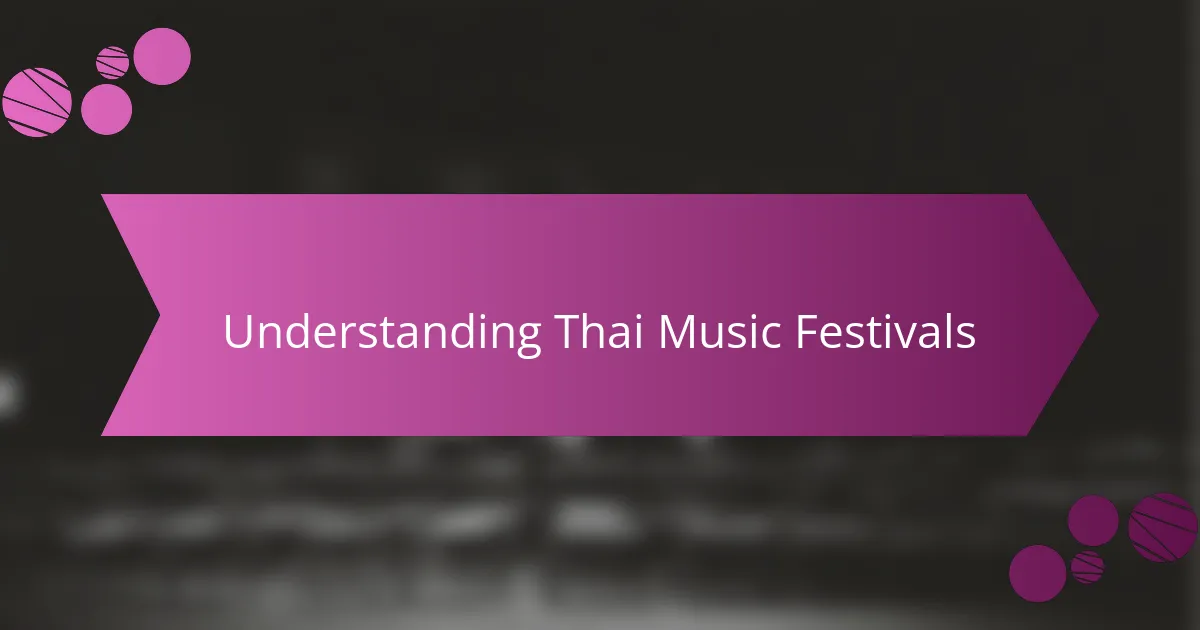
Understanding Thai Music Festivals
Thai music festivals are vibrant celebrations of culture and creativity, showcasing a unique blend of traditional and contemporary sounds. During my journey in Thailand, I found that these festivals are not just about the music; they also serve as a communal space where artists and fans connect on a profound level. The energy is infectious, and each performance tells a story that resonates with the audience, creating unforgettable moments.
One of the most striking aspects of Thai music festivals is the diversity of genres on display. From local folk music that honors ancient traditions to modern pop and rock, there’s something for everyone. I vividly recall the first festival I attended, where I was moved by a traditional dance performance that unfolded alongside contemporary beats, seamlessly bridging the past and present.
The atmosphere at these events also fosters a sense of belonging, as people from all walks of life come together. I remember spending hours chatting with musicians and fellow festival-goers, sharing our passion for music, which felt like a beautiful reminder of our shared humanity.
| Type of Music | Description |
|---|---|
| Traditional Thai | Focuses on historical and cultural stories, often accompanied by classical instruments. |
| Contemporary | Incorporates modern styles like pop and rock, appealing to younger audiences. |
| Fusion | A blend of traditional and modern elements, creating unique and innovative soundscapes. |
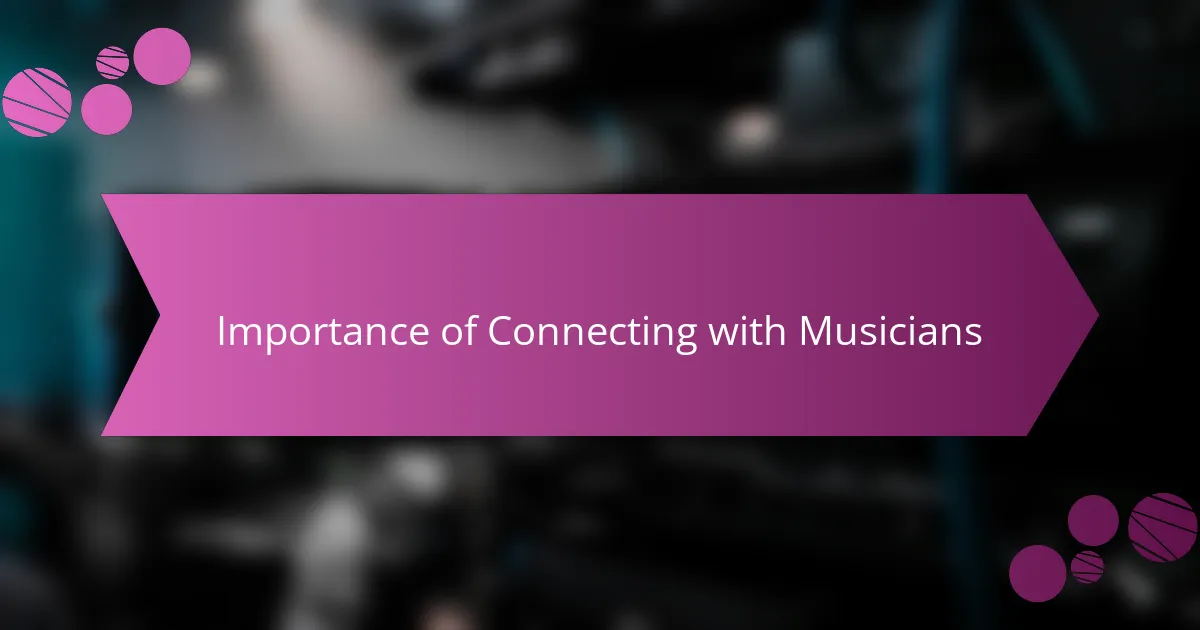
Importance of Connecting with Musicians
Connecting with musicians is vital for anyone who truly enjoys music. For me, it transformed my experience at the Thai music festival. I remember hearing a certain band play and feeling an instant connection with the lead guitarist, who shared his stories about traveling and performing. That personal touch brought the music to life in a way that simply enjoying it from afar never could.
Through these connections, I learned that every musician has a unique story that influences their art. Interacting with them fosters a deeper appreciation for their craft and enhances the festival experience. It’s like peeling back layers of emotion and creativity that you don’t always grasp when listening passively.
Additionally, these interactions often lead to collaborative opportunities and friendships that extend beyond the festival. It’s a beautiful reminder of how music unites us, creating lifelong bonds and unforgettable memories.
| Connection | Impact |
|---|---|
| Engagement with Musicians | Deeper emotional understanding of the music |
| Sharing Stories | Creates lasting memories and friendships |
| Collaboration Opportunities | Encourages artistic growth and innovation |
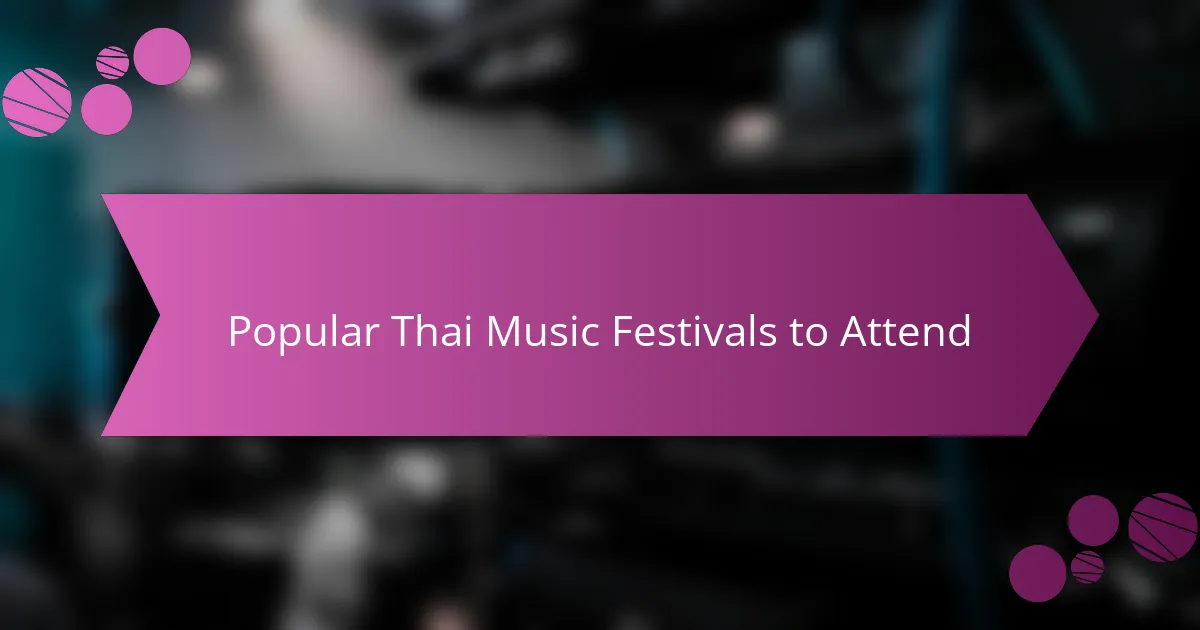
Popular Thai Music Festivals to Attend
When I first set foot in Thailand, I was immediately captivated by the vibrant music scene. I discovered that attending music festivals was a fantastic way to connect with talented musicians and like-minded music lovers. The energy at these events is infectious, and it truly feels like a celebration of culture and creativity.
Some of the popular Thai music festivals that I found particularly engaging include:
- Songkran Festival: This traditional New Year celebration is famous for its water fights, but it also features a rich array of music performances.
- Wonderfruit Festival: Combining music, art, and sustainable practices, this festival presents an eclectic mix of genres and promotes community.
- Chiang Mai Music Festival: Set against the stunning backdrop of the mountains, this festival showcases both local and international talents, creating an intimate atmosphere.
- BANGKOK MUSIC CITY: This urban festival brings together various genres, making it an excellent spot for discovering emerging artists and networking.
Experiencing these festivals not only deepened my appreciation for Thai music but also allowed me to forge genuine connections with artists and listeners alike.
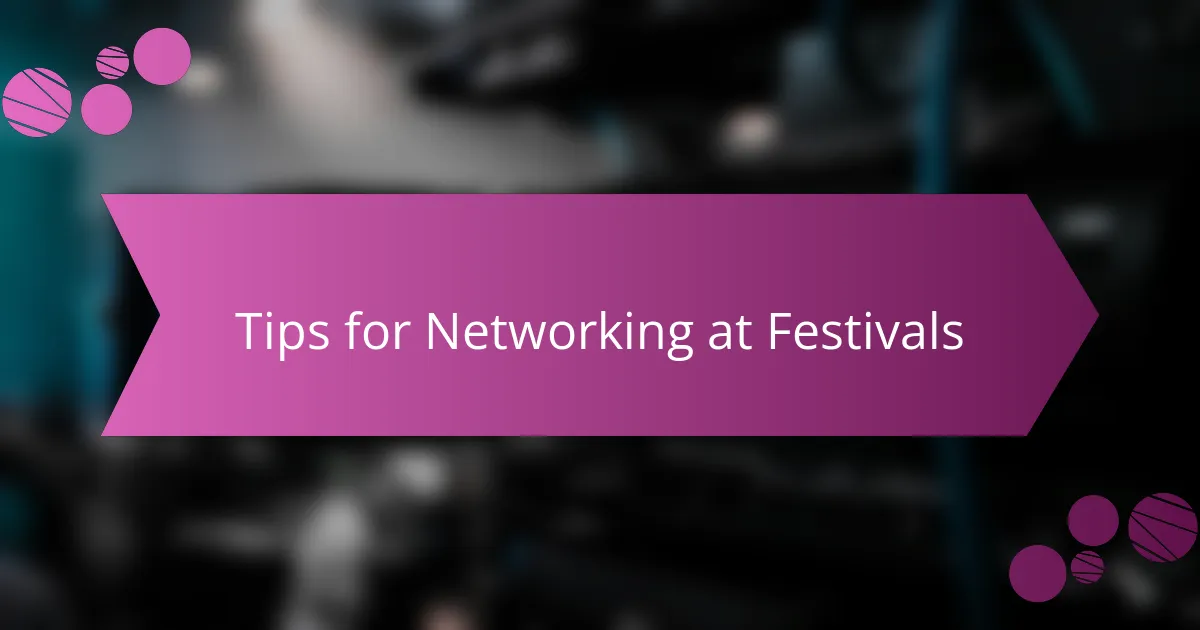
Tips for Networking at Festivals
Networking at festivals can be a game-changer for any music lover looking to connect with artists and fellow enthusiasts. One tip I found really effective is to approach musicians with genuine curiosity. Asking thoughtful questions about their music or inspiration can open up a conversation and establish a meaningful connection. I remember chatting with a local band after their set; my genuine interest not only impressed them, but it led to an invitation to their next performance, which felt incredible.
Another useful strategy is to engage with fellow festival-goers. Some of my best networking moments came from simply sharing my thoughts on a performance with strangers. It’s amazing how shared experiences can create instant bonds. I recall meeting someone during a lively jam session, which blossomed into collaborative discussions about music and even future projects.
Here’s a quick comparison table that summarizes these networking strategies:
| Tip | Description |
|---|---|
| Approach Musicians | Show genuine curiosity and ask thoughtful questions about their work. |
| Engage with Attendees | Share your experiences and thoughts with fellow festival-goers to foster connections. |
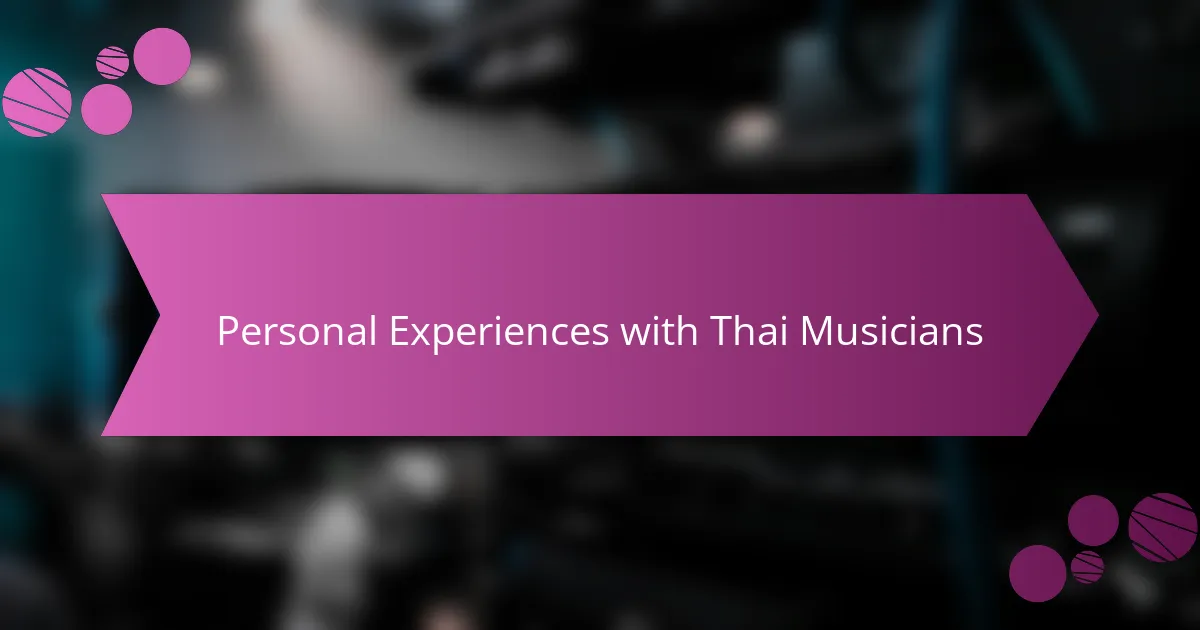
Personal Experiences with Thai Musicians
Engaging with Thai musicians has truly been a memorable part of my journey. I can recall a moment during the Chiang Mai Music Festival when I struck up a conversation with a folk artist. We chatted about the significance of traditional storytelling in his music, and his eyes sparkled with passion as he recounted how these tales connected him to his heritage. That genuine enthusiasm made me appreciate the deeper narrative woven into every note.
One evening, I had the opportunity to join a small group of musicians backstage at the Wonderfruit Festival. They invited me to share some of my favorite songs, and in return, they shared snippets of theirs. It felt amazing to exchange music recommendations, and I found myself immersed in a blend of their unique sound and my own eclectic tastes. That night, I learned that music is more than just sounds; it’s a bridge that connects our different worlds.
Reflecting on my experiences, I realize that the personal stories behind the music often elevate the performance itself. Have you ever listened to a song differently after hearing the artist’s inspiration? For me, that shift was profound. It wasn’t just about the melodies; it became a tapestry of emotions, memories, and cultural richness that resonated deeply within me.
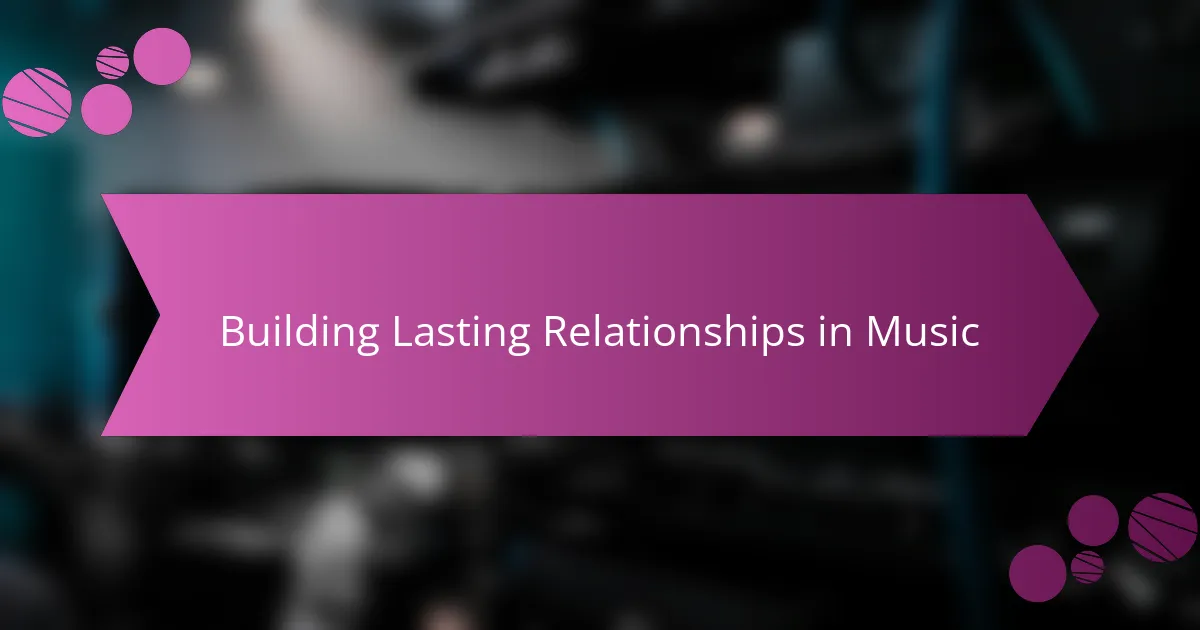
Building Lasting Relationships in Music
Building relationships with musicians in Thailand has been one of the most rewarding experiences of my music journey. I remember attending a vibrant local jam session where I shared my own music. The laugh and camaraderie that followed made it clear that music is a universal language, creating bonds that can transcend cultural boundaries.
Connecting with artists often involves more than just sharing tunes; it’s about mutual respect and understanding. During my time in Thailand, I took the time to attend workshops and collaborate on small projects, which not only enhanced my skills but also deepened my connections. Here are a few strategies that worked for me:
- Attend local performances and engage with musicians after their shows.
- Participate in music workshops or community events to learn and share.
- Volunteer at music festivals to meet and support artists while growing your network.
- Follow up with musicians on social media to nurture your relationship.
- Share your experiences and stories to create a sense of trust and camaraderie.
